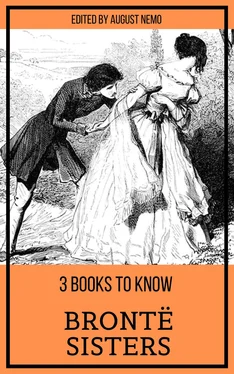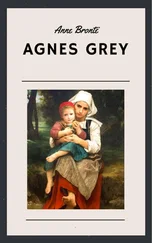––––––––
THOUGH MY AFFECTIONS might now be said to be fairly weaned from Eliza Millward, I did not yet entirely relinquish my visits to the vicarage, because I wanted, as it were, to let her down easy; without raising much sorrow, or incurring much resentment,—or making myself the talk of the parish; and besides, if I had wholly kept away, the vicar, who looked upon my visits as paid chiefly, if not entirely, to himself, would have felt himself decidedly affronted by the neglect. But when I called there the day after my interview with Mrs. Graham, he happened to be from home—a circumstance by no means so agreeable to me now as it had been on former occasions. Miss Millward was there, it is true, but she, of course, would be little better than a nonentity. However, I resolved to make my visit a short one, and to talk to Eliza in a brotherly, friendly sort of way, such as our long acquaintance might warrant me in assuming, and which, I thought, could neither give offence nor serve to encourage false hopes.
It was never my custom to talk about Mrs. Graham either to her or any one else; but I had not been seated three minutes before she brought that lady on to the carpet herself in a rather remarkable manner.
‘Oh, Mr. Markham!’ said she, with a shocked expression and voice subdued almost to a whisper, ‘what do you think of these shocking reports about Mrs. Graham?—can you encourage us to disbelieve them?’
‘What reports?’
‘Ah, now! you know!’ she slily smiled and shook her head.
‘I know nothing about them. What in the world do you mean, Eliza?’
‘Oh, don’t ask me! I can’t explain it.’ She took up the cambric handkerchief which she had been beautifying with a deep lace border, and began to be very busy.
‘What is it, Miss Millward? what does she mean?’ said I, appealing to her sister, who seemed to be absorbed in the hemming of a large, coarse sheet.
‘I don’t know,’ replied she. ‘Some idle slander somebody has been inventing, I suppose. I never heard it till Eliza told me the other day,—but if all the parish dinned it in my ears, I shouldn’t believe a word of it—I know Mrs. Graham too well!’
‘Quite right, Miss Millward!—and so do I—whatever it may be.’
‘Well,’ observed Eliza, with a gentle sigh, ‘it’s well to have such a comfortable assurance regarding the worth of those we love. I only wish you may not find your confidence misplaced.’
And she raised her face, and gave me such a look of sorrowful tenderness as might have melted my heart, but within those eyes there lurked a something that I did not like; and I wondered how I ever could have admired them—her sister’s honest face and small grey optics appeared far more agreeable. But I was out of temper with Eliza at that moment for her insinuations against Mrs. Graham, which were false, I was certain, whether she knew it or not.
I said nothing more on the subject, however, at the time, and but little on any other; for, finding I could not well recover my equanimity, I presently rose and took leave, excusing myself under the plea of business at the farm; and to the farm I went, not troubling my mind one whit about the possible truth of these mysterious reports, but only wondering what they were, by whom originated, and on what foundations raised, and how they could the most effectually be silenced or disproved.
A few days after this we had another of our quiet little parties, to which the usual company of friends and neighbours had been invited, and Mrs. Graham among the number. She could not now absent herself under the plea of dark evenings or inclement weather, and, greatly to my relief, she came. Without her I should have found the whole affair an intolerable bore; but the moment of her arrival brought new life to the house, and though I might not neglect the other guests for her, or expect to engross much of her attention and conversation to myself alone, I anticipated an evening of no common enjoyment.
Mr. Lawrence came too. He did not arrive till some time after the rest were assembled. I was curious to see how he would comport himself to Mrs. Graham. A slight bow was all that passed between them on his entrance; and having politely greeted the other members of the company, he seated himself quite aloof from the young widow, between my mother and Rose.
‘Did you ever see such art?’ whispered Eliza, who was my nearest neighbour. ‘Would you not say they were perfect strangers?’
‘Almost; but what then?’
‘What then; why, you can’t pretend to be ignorant?’
‘Ignorant of what?’ demanded I, so sharply that she started and replied,—
‘Oh, hush! don’t speak so loud.’
‘Well, tell me then,’ I answered in a lower tone, ‘what is it you mean? I hate enigmas.’
‘Well, you know, I don’t vouch for the truth of it—indeed, far from it—but haven’t you heard—?’
‘I’ve heard nothing, except from you.’
‘You must be wilfully deaf then, for anyone will tell you that; but I shall only anger you by repeating it, I see, so I had better hold my tongue.’
She closed her lips and folded her hands before her, with an air of injured meekness.
‘If you had wished not to anger me, you should have held your tongue from the beginning, or else spoken out plainly and honestly all you had to say.’
She turned aside her face, pulled out her handkerchief, rose, and went to the window, where she stood for some time, evidently dissolved in tears. I was astounded, provoked, ashamed—not so much of my harshness as for her childish weakness. However, no one seemed to notice her, and shortly after we were summoned to the tea-table: in those parts it was customary to sit to the table at tea-time on all occasions, and make a meal of it, for we dined early. On taking my seat, I had Rose on one side of me and an empty chair on the other.
‘May I sit by you?’ said a soft voice at my elbow.
‘If you like,’ was the reply; and Eliza slipped into the vacant chair; then, looking up in my face with a half-sad, half-playful smile, she whispered,—‘You’re so stern, Gilbert.’
I handed down her tea with a slightly contemptuous smile, and said nothing, for I had nothing to say.
‘What have I done to offend you?’ said she, more plaintively. ‘I wish I knew.’
‘Come, take your tea, Eliza, and don’t be foolish,’ responded I, handing her the sugar and cream.
Just then there arose a slight commotion on the other side of me, occasioned by Miss Wilson’s coming to negotiate an exchange of seats with Rose.
‘Will you be so good as to exchange places with me, Miss Markham?’ said she; ‘for I don’t like to sit by Mrs. Graham. If your mamma thinks proper to invite such persons to her house, she cannot object to her daughter’s keeping company with them.’
This latter clause was added in a sort of soliloquy when Rose was gone; but I was not polite enough to let it pass.
‘Will you be so good as to tell me what you mean, Miss Wilson?’ said I.
The question startled her a little, but not much.
‘Why, Mr. Markham,’ replied she, coolly, having quickly recovered her self-possession, ‘it surprises me rather that Mrs. Markham should invite such a person as Mrs. Graham to her house; but, perhaps, she is not aware that the lady’s character is considered scarcely respectable.’
‘She is not, nor am I; and therefore you would oblige me by explaining your meaning a little further.’
‘This is scarcely the time or the place for such explanations; but I think you can hardly be so ignorant as you pretend—you must know her as well as I do.’
‘I think I do, perhaps a little better; and therefore, if you will inform me what you have heard or imagined against her, I shall, perhaps, be able to set you right.’
Читать дальше











